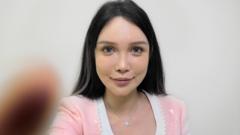In the realm of social media, where wellness influencers often dominate, a troubling trend has emerged surrounding polycystic ovary syndrome (PCOS). Many women struggling with this common hormonal disorder, which affects roughly one in ten women, are falling prey to the promises made by influencers who are selling unproven tests and supplements. Sophie, who suffered from painful periods, weight gain, and depression due to her diagnosis, turned to influencer Kourtney Simmang after failing to find adequate medical support.
Kourtney advertised an expensive treatment plan for $3,600 (£2,800) without any medical qualifications, assuring Sophie that she could address the "root cause" of PCOS—despite researchers not clearly defining such a cause. After nearly a year of following the program, Sophie saw no improvement in her symptoms and felt demoralized about her body.
Medical experts, including Dr. Jen Gunter, a recognized gynecologist and health educator, have voiced concerns that influencers often exploit the knowledge gaps in women's health, particularly for conditions like PCOS. Many influencers lack formal qualifications, claiming to be "nutritionists" or “hormone coaches," often misleading women with false narratives about effective treatments. They frequently utilize platforms like TikTok and Instagram, where around 50% of the most-searched PCOS content perpetuates health misinformation.
The World Health Organization (WHO) suggests that about 70% of women with PCOS globally are undiagnosed, and even those diagnosed can struggle to find effective remedies. The influencers propagate misleading claims, asserting that particular diets or supplements could cure the condition despite a lack of scientific backing, while actual medical interventions may be overlooked or misrepresented.
Among the notable figures in this space is Tallene Hacatoryan, a registered dietician with over two million followers, who sells supplements urging followers to avoid traditional pharmaceuticals—and instead promises healing through natural means. Her recommendations include restrictive diets that may exacerbate symptoms rather than provide relief.
Women from across the globe including those in Nigeria, Brazil, and Australia, have shared their experiences with these influencers, often feeling the weight of the misinformation they spread. Many express how such approaches led to further health complications or negative self-perceptions, with experts warning that they can even catalyze eating disorders.
As the awareness of the legitimacy of PCOS care increases, women like Medlyn are working to dismantle the stigma surrounding the condition and encourage evidence-based treatments. With existing resources available for managing PCOS, health professionals urge those struggling to consult specialists rather than rely on unverified influencer advice. The cycle of misinformation presents a stark reminder of the importance of seeking legitimate medical guidance and the dire consequences of allowing unqualified individuals to exploit vulnerable populations.
In conclusion, women with PCOS should advocate for themselves by demanding expert care, rather than succumbing to the enticing yet potentially harmful recommendations circulating on social media.




















